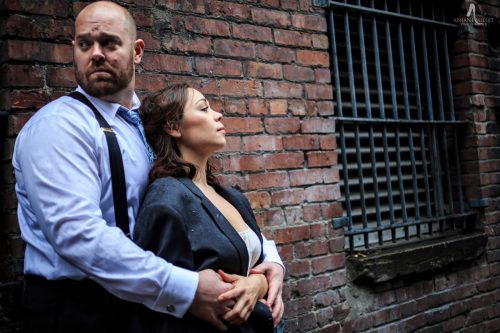
When Mark Beudert arrived as its artistic director in 2006, Eugene Opera was in trouble. It was losing so much money that it could only afford to stage a single production in 2006-7, down from its average of three per year.
Eugene Opera (EO) had hit rough patches since its 1977 founding by longtime Eugene classical music teacher and conductor Philip Bayles, who directed the company for the first decade, and Ginevra Ralph, also of The Shedd.
Performing first in high school gyms and then becoming a resident company of the Hult Center when it opened in 1982, the opera steadily grew in quality and resources (props, lighting, costumes), occasionally scoring some soon-to-be big names like Deborah Voigt and Susan Graham.
But opera is expensive, and after falling $340,000 in debt during the first Republican recession in the early 1990s, it recovered along with the economy. But in the mid-2000s, several regional companies like San Diego Opera and even the venerable New York City Opera succumbed (soon to be revived) to a confluence of economic and cultural changes.
EO’s early struggles proved a blessing in disguise. “The companies that went under had a lot of fat and had to trim really quickly,” Beudert recalls. “We had already downsized.”
Since it wasn’t dependent on the big donations and grants (which dwindled during the downturn) that first fueled and then failed many opera companies, EO had to rely mostly on ticket sales and volunteer help to tide it over while it gradually built up a donor base. Beudert and the executive director were the only staffers until 2012.
As Beudert tells it, that leanness forced the company to focus on the essentials. “Opera is about singers,” Beudert says. “You get really good singers and put them in the most comfortable place possible,” instead of staging the splashy sets and expensive productions that sank or burdened even the biggest companies like New York’s Metropolitan Opera.
“We’re a singer’s company,” Beudert told emerging vocalists looking to make a name in opera. “If you have the urge to be a star, this is the place to be.” That emphasis brought rising stars like Cecilia Lopez and Kelly Kay Hogan, who in 2008 became the first EO singer who went on to sing at the Met.
Leanness forced the company to reach out to audiences, since it depended so much more on ticket sales than many companies. Though immersed in opera and classical music since his early days in New York, Beudert also spent a couple years performing on Broadway, including in Pirates of Penzance with Linda Ronstadt. “An old Broadway guy told me there’s a direct connection between the audience’s pleasure and whether the cast eats,” Beudert explains. “That’s why there’s so much energy on Broadway.”
Unlike other companies, EO didn’t let crisis cause conservatism. Noticing that many companies’ endless recycling of the so-called “top ten” warhorses like La Boheme and Carmen was wearing thin (Sacramento Opera, for example, went under during a season in which it staged nothing but standards), Beudert declared that “becoming bold is mandatory,” and offered contemporary operas like John Adams’s Nixon in China and Jake Heggie’s Dead Man Walking.
To connect the community to those and other productions, the company initiated an outreach strategy that includes exhibitions, talks and other ancillary events at the library and University of Oregon, creating buzz and providing historical context — the social conditions like poverty, revolution, nationalism, imperialism — that spawned these works of art, and connecting them to today’s issues.